How and When to Clean Your Farm Fresh Eggs
Sometimes dirty eggs come into the house; therefore, it’s important to know when and how to clean fresh farm eggs properly.

Backyard chickens are the gateway farm animal, and backyard poultry are here to stay! Fresh farm eggs are an incredible perk to living this intentionally slow lifestyle. Over and over again, I’m reminded that food is best when it’s as close to nature as possible.
We collect fresh, warm eggs, bring them into the house, and immediately make breakfast (or lunch or dinner) with them. The egg yolks are perky and brightly colored, and the egg whites are clear. The egg tastes exactly the way it’s supposed to…delicious!
Homegrown eggs have more flavor, vitamins, omega-3 fatty acids, beta-carotene, and less saturated fat and cholesterol than commercial eggs. As if that wasn’t enough, fresh, unwashed eggs are easier to store and last longer than eggs from the grocery store. That’s because you can just leave them sitting out on your kitchen counter!
But sometimes dirty eggs come into the house. Most of the time it’s not necessary to wash your farm fresh eggs because they will generally be clean. But what about when it’s been raining a lot and the eggs come in dirty? Should you be concerned? Not necessarily! It’s important to know when and how to clean fresh farm eggs so that you don’t flirt with food poisoning.
This post contains affiliate links, which means I make a small commission at no cost to you if you place a qualifying purchase through any of the links. Read my full disclosure here. Thanks for your support!
Should you wash your farm fresh eggs?
It’s typically not necessary to wash fresh farm eggs and it’s even discouraged. In fact, it’s illegal to wash commercial eggs in Europe. That’s because fresh farm eggs have a protective layer called the “bloom” or “cuticle” that seals and protects the inside of the egg from bad bacteria and pathogens.
Egg shells are very porous. If there was no natural coating on the shell, bacteria could easily pass into the egg and cause problems for developing baby chicks.
Egg washing removes the bloom from the outside of the egg and thus makes the egg susceptible to contamination. Therefore, you should never wash a fertilized egg that you intend to incubate to hatch baby chicks. (I wrote this blog post on how to hatch eggs using an incubator if you’re interested in learning more.)
If your eggs have some mud or a little bit of poop on them, the protective coating seals out the bad bacteria from the egg. Try to wait until the debris is dry and then wipe it off with a dry cloth. Wiping off the debris won’t remove the protective bloom.
When should you clean dirty eggs?
The best time to clean dirty eggs is right before you plan on using them. Also, if your local laws require it, you should clean your eggs before selling them.
Say you have a bowl or basket full of dirty eggs sitting on your kitchen counter and you want to make an omelet. Get the eggs that you need and wash them right before you plan on cracking them open and cooking your omelet.
Additionally, you can wash your eggs if you plan on selling them or storing them in your refrigerator. Indeed, most states in the United States require eggs to be washed and the customers probably expect clean eggs.
If selling eggs is in your future, look up your local county agricultural extension office. They should know what the egg-selling laws are for your state.
How to Clean Fresh Eggs
Assuming you’ve tried wiping off any mud and debris from your eggs and are not satisfied, the best way to clean your fresh eggs is to follow these steps.
- Clean fresh eggs using lukewarm water.
- Don’t use soap or other abrasive cleaners.
- Don’t leave your fresh eggs soaking in water.
- Do a float test on your farm eggs.
- Dry your clean eggs.
- Refrigerate washed eggs in clean containers.
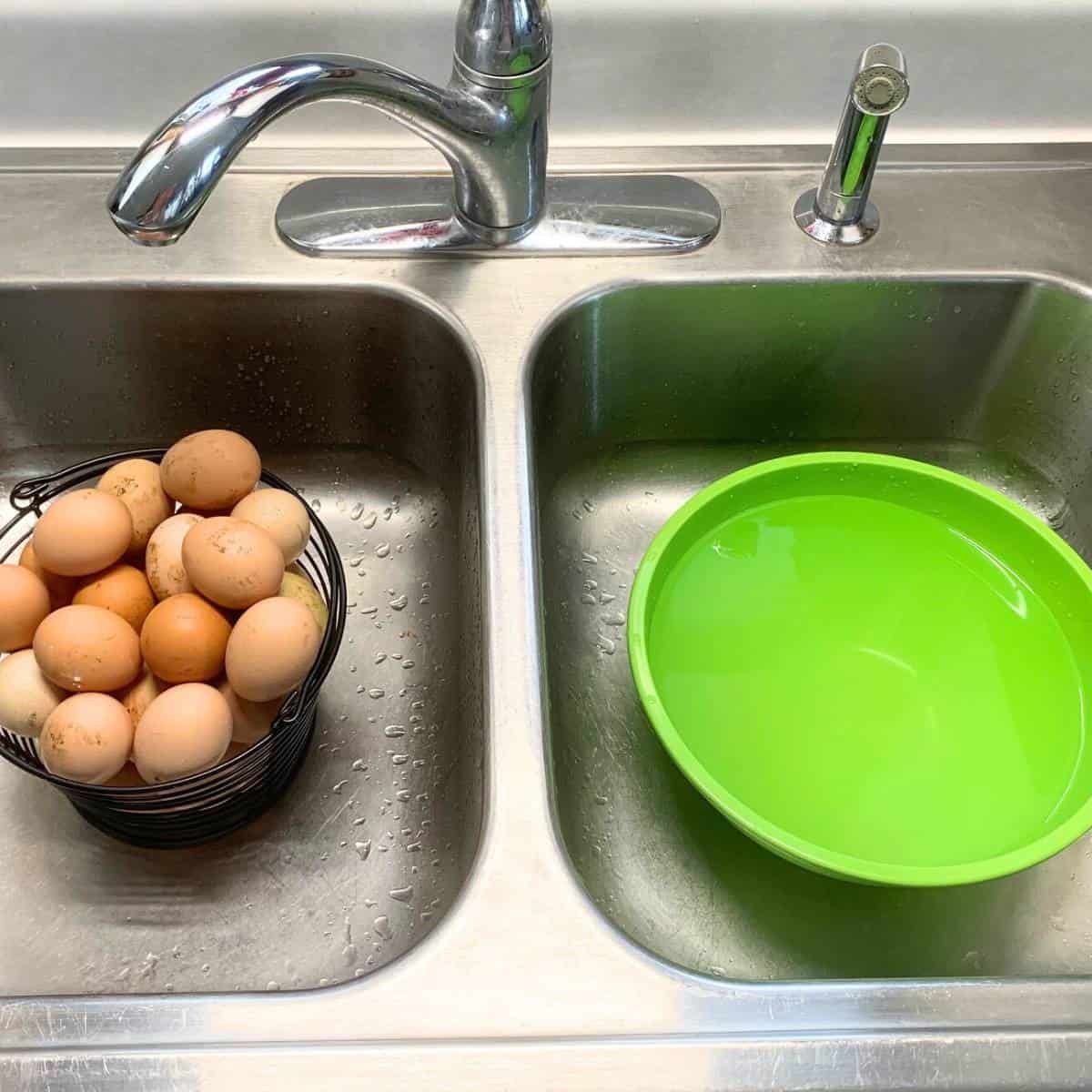
1. Clean fresh eggs using lukewarm water.
The easiest way to clean debris off an egg is to run it under some lukewarm to cool water and wipe it off with a soft cloth.
Don’t use hot or cold water to wash your eggs. Hot water opens the egg pores up and bad bacteria (like salmonella) can find its way inside the egg to contaminate it.
Likewise, cold water shrinks the shell’s pores and bad bacteria already on a pore may be forced inside of the egg like a vacuum to contaminate it. It’s best to just use room temperature water that’s about the same temperature as your egg for cleaning.
2. Don’t use soap or other abrasive cleaners.
We are all used to washing dishes in our sink, but when it comes to washing eggs, try to treat it more like raw meat than dishes. You would never wash raw meat with soap, so don’t use soap or another cleaning solution on your egg.
Chemicals might leach inside your egg making it unsafe to eat. It’s also not necessary to use soap to get any debris off your egg.
I have no idea what makes up the bloom on the outside of the egg, but when you put a farm egg under lukewarm water, any debris is very easily wiped away. It’s not slippery, but you can tell that the coating on the egg keeps any debris from sticking to it.
3. Don’t leave your fresh eggs soaking in water.
For food safety, don’t leave your fresh eggs soaking in water. Just expose them to enough water to gently wipe off any debris with a clean dish rag.
The protective bloom on the egg will soften when it’s exposed to water. If the egg is left in a bowl of water and the bloom softens too much, any bad bacteria in the water could potentially make its way inside the egg. And you don’t want that!
Plus again, it’s not necessary to soak your eggs. The coating on the outside of the egg makes it easy to wipe away any debris off the eggshell.
4. Do a float test on your farm eggs.
After I wash our eggs in lukewarm water, I like to do a float test to check that they are still good if I’m not sure how old the eggs are…which sometimes happens if I’m not on top of all the eggs coming into the house.
To do a float test, I put dirty eggs on one side of my sink to be washed and I put a bowl of clean, lukewarm water on the other side of my sink. As I wash the eggs and rinse them off, I’ll put them into the bowl of clean, lukewarm water. If they sink to the bottom, I know they’re good.
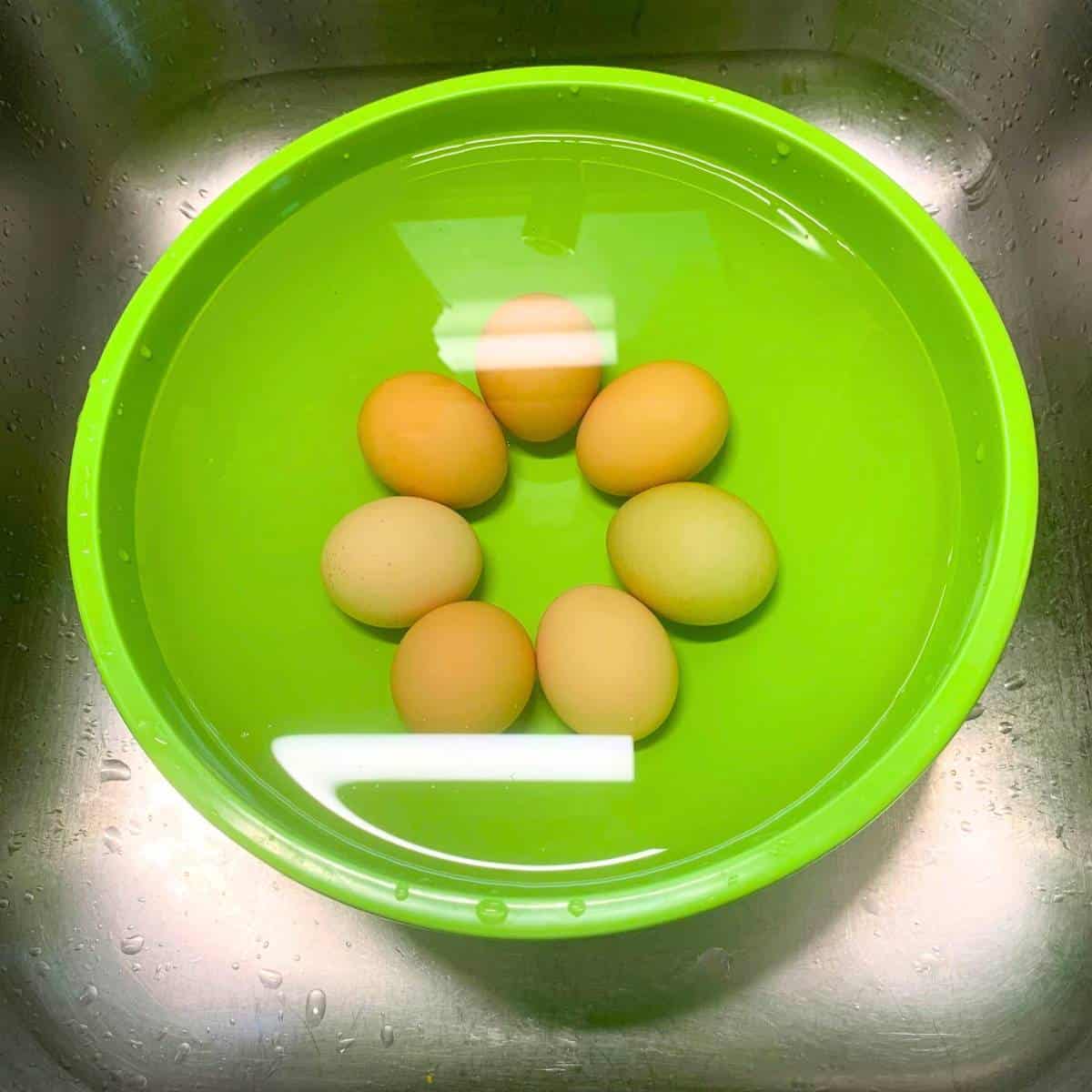
However, if the eggs float to the top of the water, I know they’re full of gas and have gone bad, so I will set them aside.
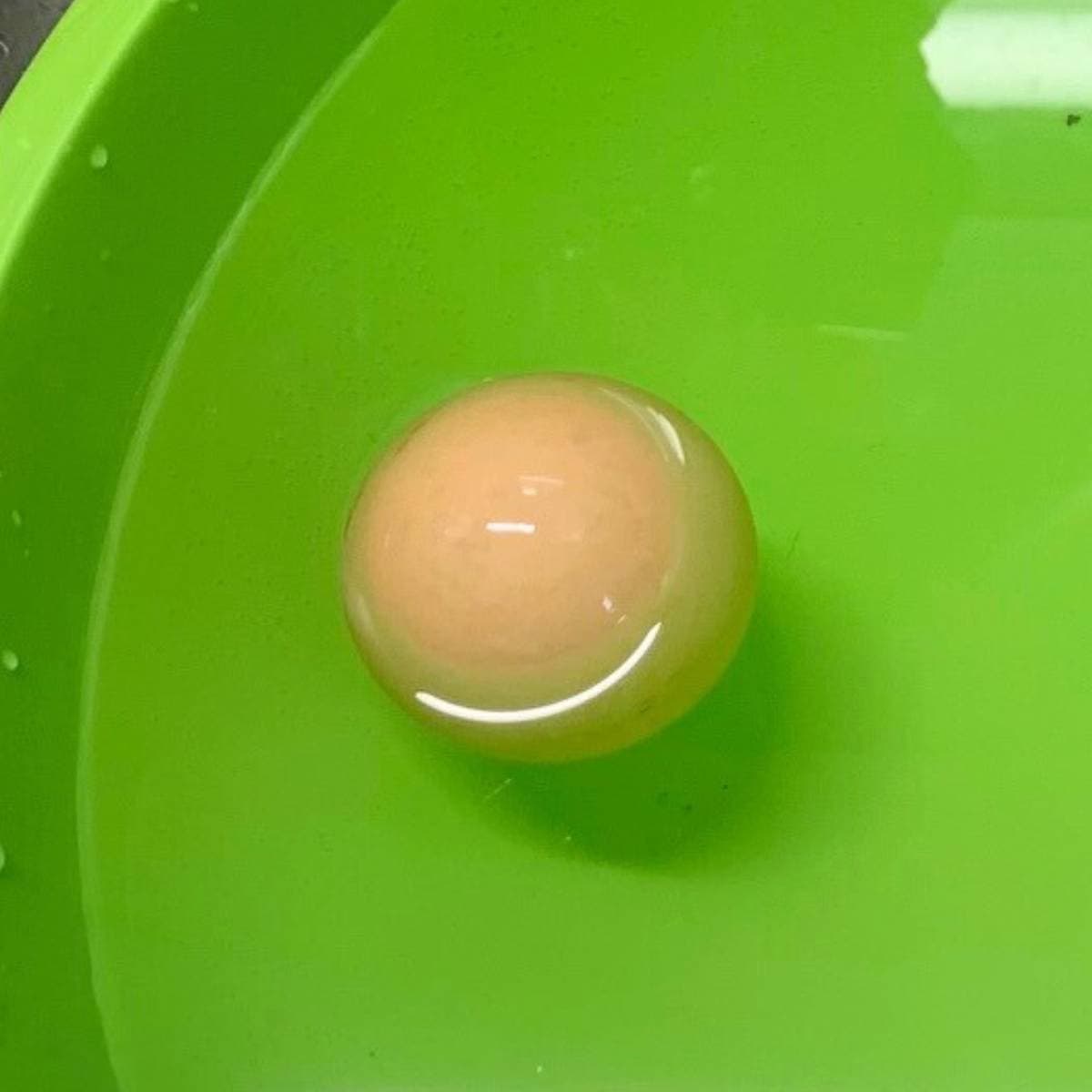
After a close inspection of any floating eggs, you’ll probably discover why it’s bad…unless it’s just old and full of smelly gas.
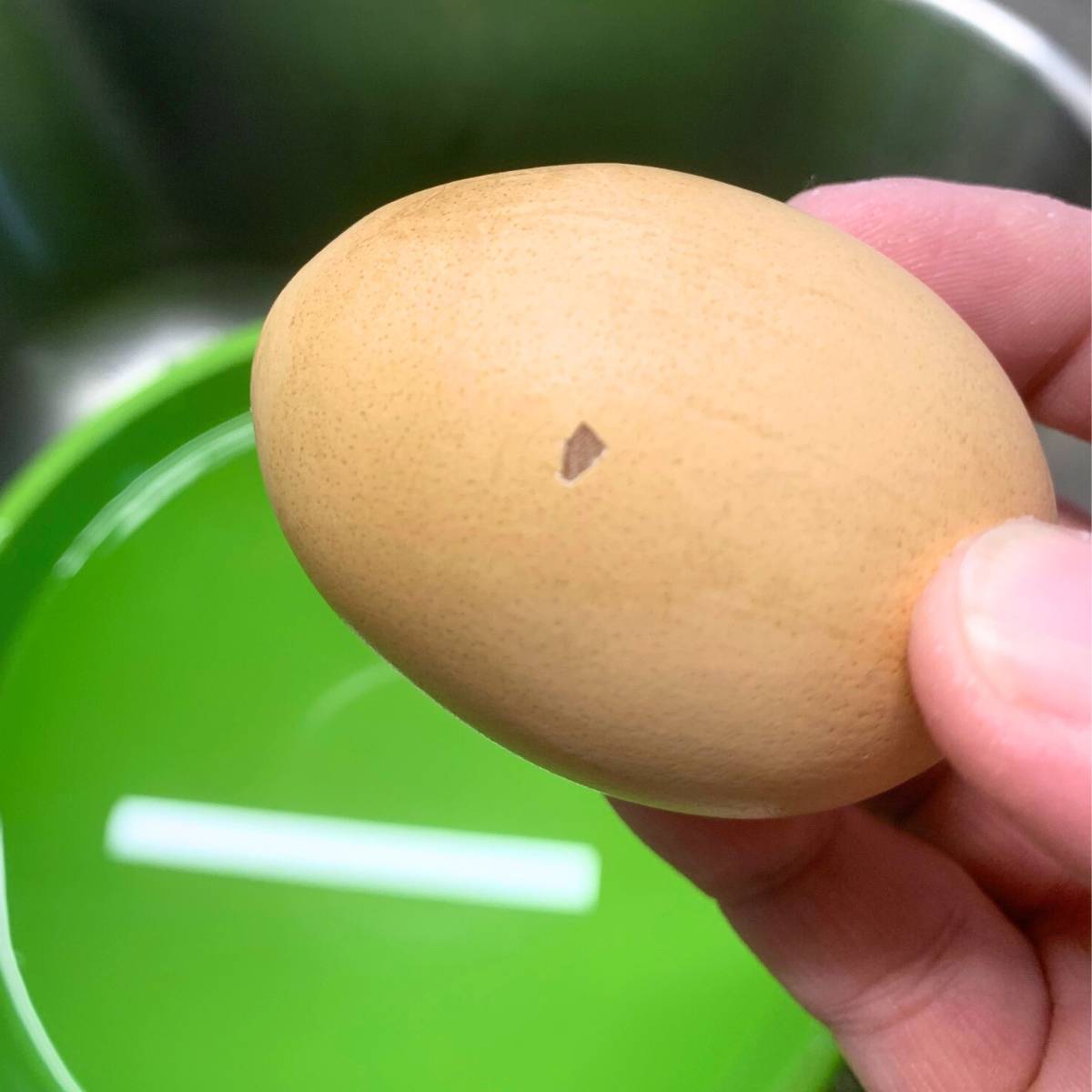
If one end sinks to the bottom but the other end tries to float, I know that I need to use them up first.
The fresher a raw egg is, the flatter it will lay in the bottom of your bowl of water. Fresh eggs start off laying down horizontally in a bowl of water. However, as the egg gets older and loses its freshness, it’ll start going vertical in your bowl of water. As long as one end of the egg is still touching the bottom of your bowl, your egg should still be safe to eat.
Personally, I crack questionable eggs into a separate bowl one at a time before I use them. I will only use them if they look and smell good. If they don’t, they go outside where the dogs or other farm animals gobble them up.
5. Dry your clean eggs.
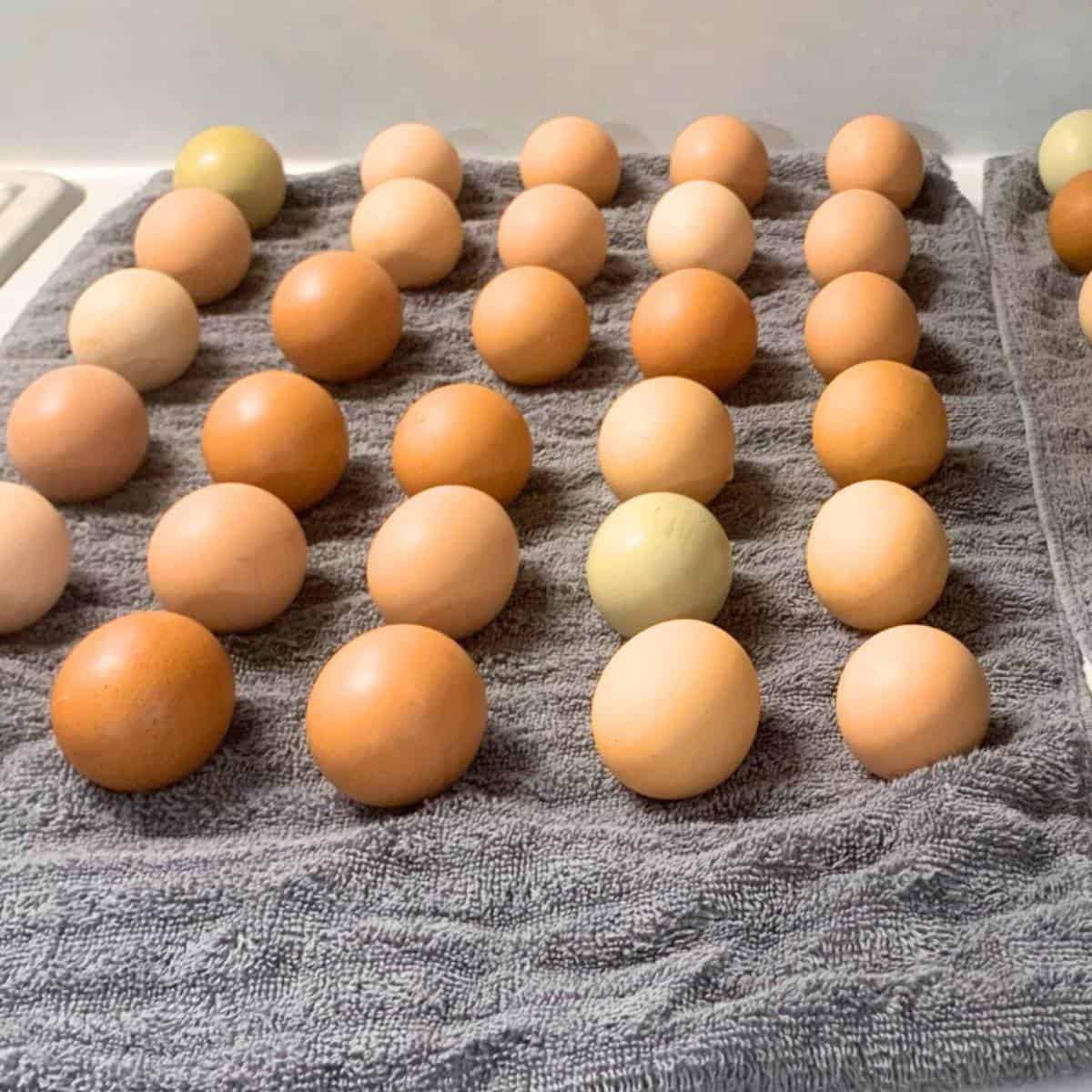
After washing your farm eggs clean, get out a clean kitchen towel or paper towel. As you wash your eggs and do the float test, continue in assembly-line fashion and lay them out to air-dry on your towel.
The top side of the egg will dry quickly.
6. Refrigerate washed eggs in clean containers.
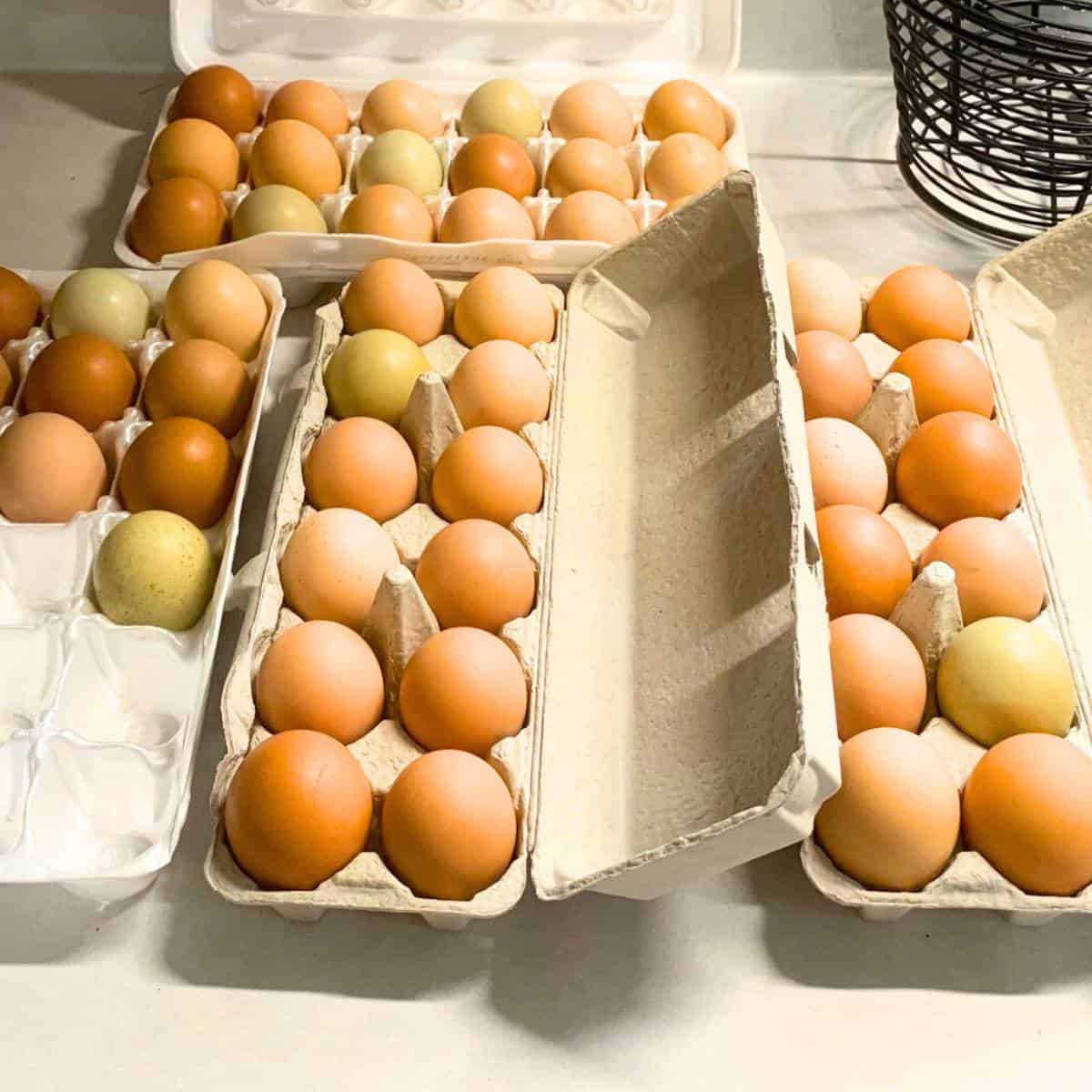
When all your eggs are clean and drying on kitchen towels, it’s time to package them up in clean egg cartons.
They don’t necessarily have to be unused egg cartons but since you’ve removed the protective bloom around the egg, make sure you use a clean egg carton to store your eggs. Don’t use an egg carton that has any dirt, broken egg residue, or other debris inside it that could potentially infiltrate your eggs.
Alternatively, you can store your washed eggs in any container that will hold them.
How long will farm fresh eggs last?
You can safely leave your farm fresh chicken eggs sitting in a bowl or egg basket on your kitchen counter for at least 2 weeks. Refrigeration isn’t necessary as long as the eggs have the protective bloom on them. If you store eggs in your refrigerator or a cold cellar, expect a shelf life of 4 weeks or more depending on the temperature.
It’s a good idea to write a date on your egg carton if they tend to pile up in your refrigerator. Use the First In, First Out (FIFO) method of inventory to use up your eggs. That means you use the oldest eggs before the newest ones.
I’ll usually do another float test on refrigerated eggs that are more than 2 months old before using them.
Coop Maintenance: Helpful Tips to Avoid Dirty Eggs
Whether you have an elaborate stationary chicken coop or your backyard flock is free to graze where their little hearts delight, the hens will lay their eggs somewhere. If your eggs are coming into the house dirty, take a look at how clean the chicken’s environment is. Specifically, evaluate the cleanliness of their nesting box.
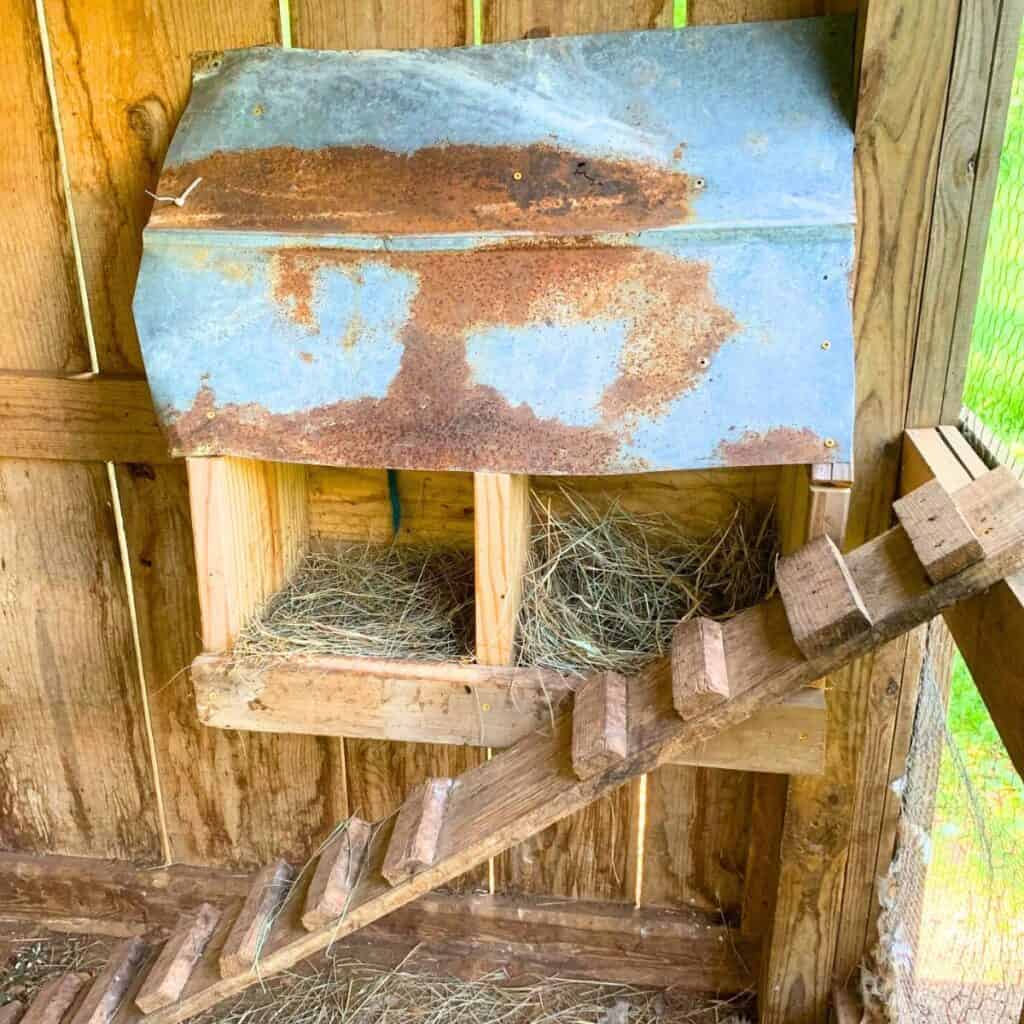
It’s important that wherever the chickens sleep and roost for the night and wherever they lay eggs is kept clean and tidy.
Clean out the chicken manure and add some fresh hay, straw, or pine shavings to their nesting boxes if the problem is there. Or if they’re laying eggs in a dirty spot outside of the nest boxes, try to clean out those spots or restrict their access.
We like to let our chickens free-range so they can walk around and get all the sunshine, bugs, grass, and seeds they want and can find. They also keep the pastures looking good by scratching through and spreading out cow patties.
One of the benefits to allowing our chickens free access to go where they like and eat what they want is that the eggs are more nutritious. Another benefit is that the chickens distribute their poop away from their nesting boxes during the day. That means we don’t have to clean up after them as much.
Being the social flock that they are, chickens like to sleep near their friends at night. But they don’t stop pooping. So make sure you’re cleaning their roosting area frequently if that’s where you find dirty eggs.
Should you confine or free-range your chickens?
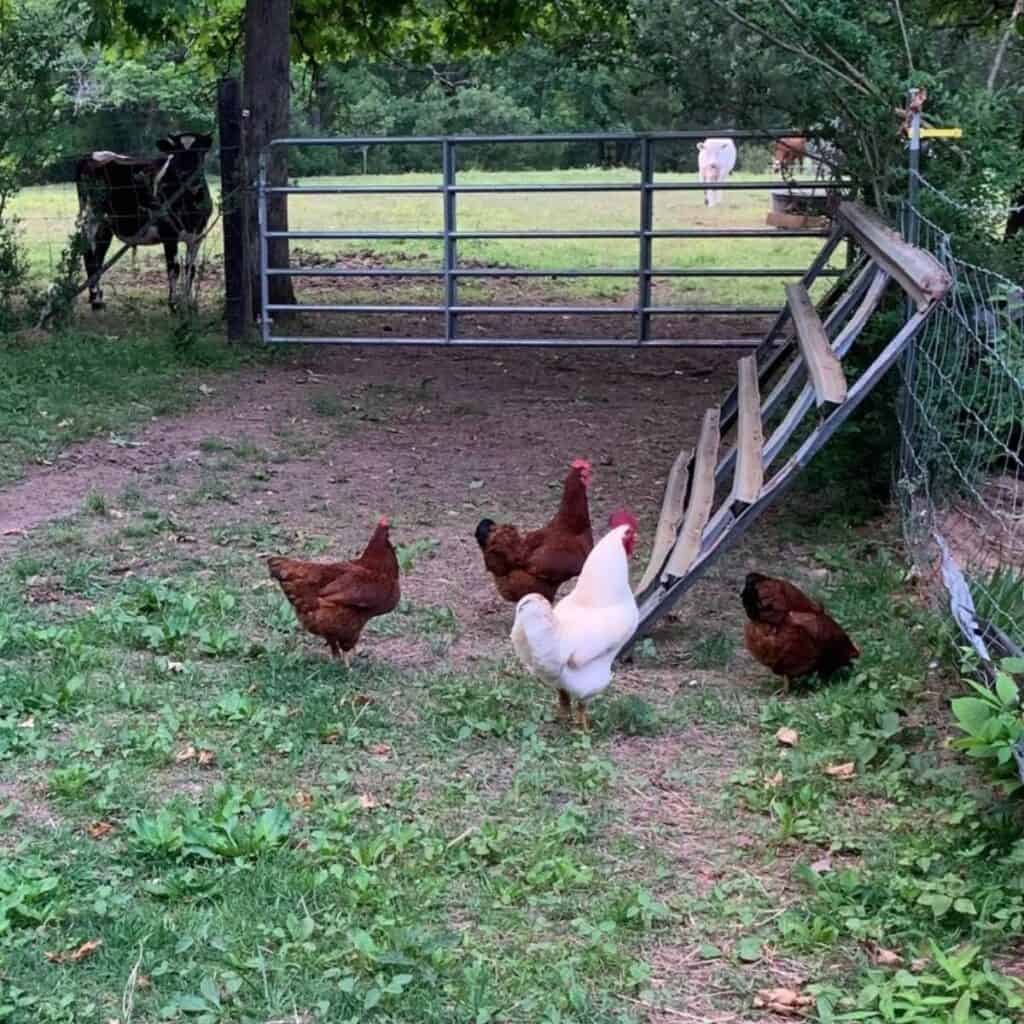
We like to let our own chickens free-range so they can walk around and get all the sunshine, bugs, grass, and seeds they want and can find. They also keep the pastures looking good by scratching through and spreading out cow patties.
One of the benefits to allowing our chickens free access to go where they like and eat what they want is that the eggs are more nutritious. Another benefit is that the chickens distribute their poop evenly during the day. That means we don’t have to clean up after them as much.
I wrote a blog post explaining more of our methodology of raising chickens and other animals in this blog post on how we raise our livestock if you would like to learn more.
Being the social flock that they are, chickens like to sleep near their friends at night. But they don’t stop pooping. So make sure you’re cleaning their roosting area frequently if that’s where you find dirty eggs.
While we do prefer to free-range our chickens, I do want to mention that it’s sometimes necessary to confine them.
For example, we recently put eight of our meat bird hens into our mobile hoop coop. We will collect their eggs for 2 weeks and then introduce the meat bird rooster. At that point, we will collect the fertilized eggs and incubate them in our house.
Then we can hatch new baby chicks to grow out and harvest next summer. It’s a bit of a compromise between confinement and free-range because we move the hoop coop every day. So the chickens still have access to some green grass and bugs but we also have to feed them.
How much do you know about hens and their eggs?
- How many pores do chicken eggshells have?
- A. Less than 1,000
- B. Around 5,000
- C. Up to 17,000
- D. Over 25,000
- Which eggs have the most nutrition?
- A. White eggs
- B. Brown eggs
- C. Green eggs
- D. Eggshell color is not an indicator of nutrition.
- How long does it take a hen to produce an egg from ovulation to laying?
- A. 6 to 8 hours
- B. 24 to 26 hours
- C. 3 to 5 days
- D. 7 to 10 days
- How many functional ovaries does a hen have?
- A. 1
- B. 2
- C. 3
- D. None
- What is the eggshell made of?
- A. Potassium chloride
- B. Magnesium hydroxide
- C. Calcium carbonate
- D. Keratin
Answers according to the USDA “Biology of Eggs”:
- C
- D
- B
- A
- C
Shop This Post!
Cotton Waffle Weave Kitchen Dish Cloths
Pin It For Later!
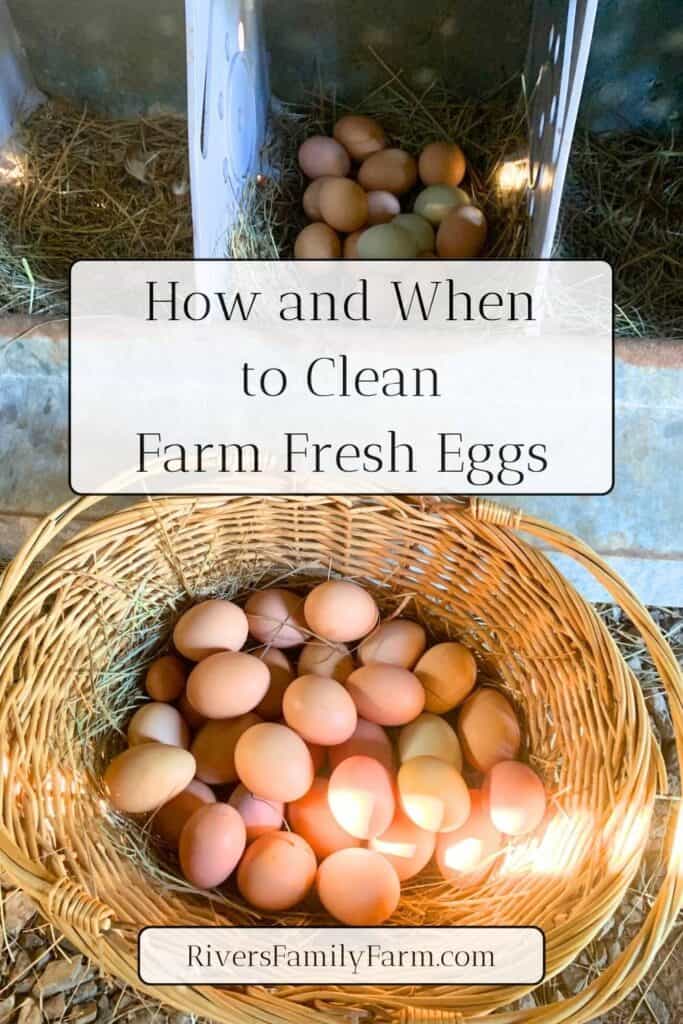
Other Related Posts
Cook Eggs in a Cast Iron Skillet Without Sticking
Can Dogs Eat Scrambled Eggs With Milk?
How to Hard Boil and Peel Eggs (Even Farm Fresh)
The Secret to Raising Livestock for Cheap

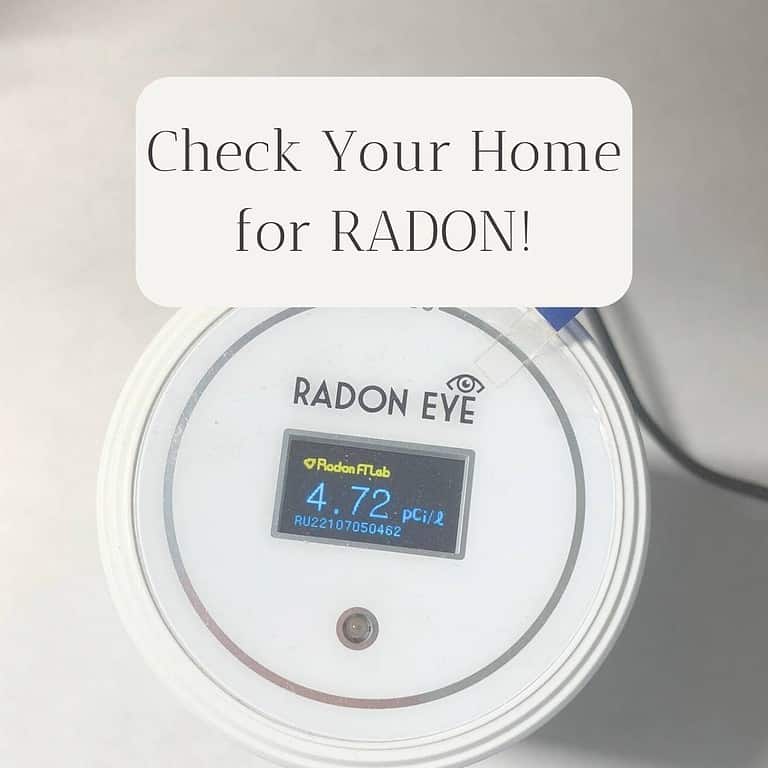
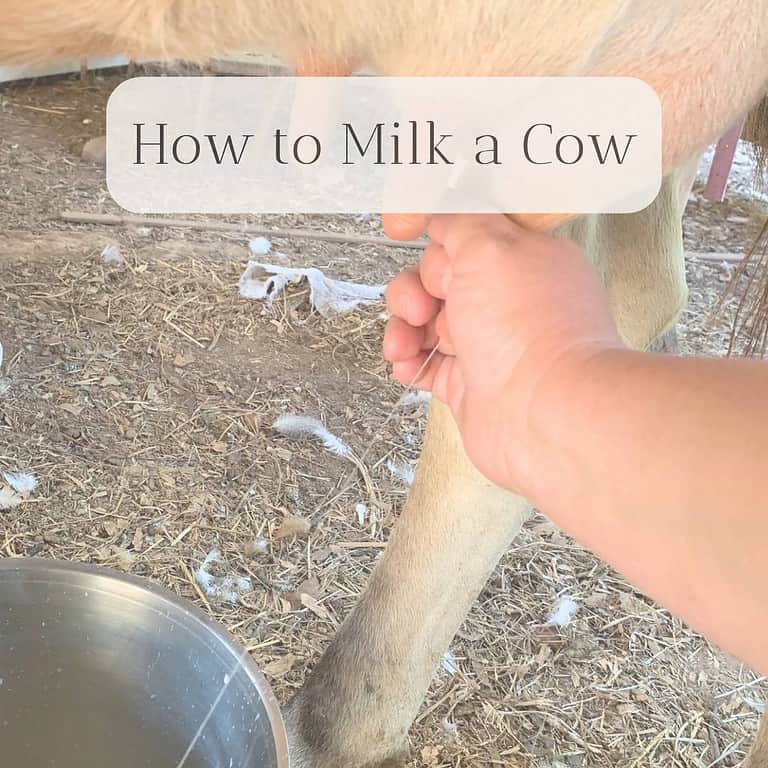
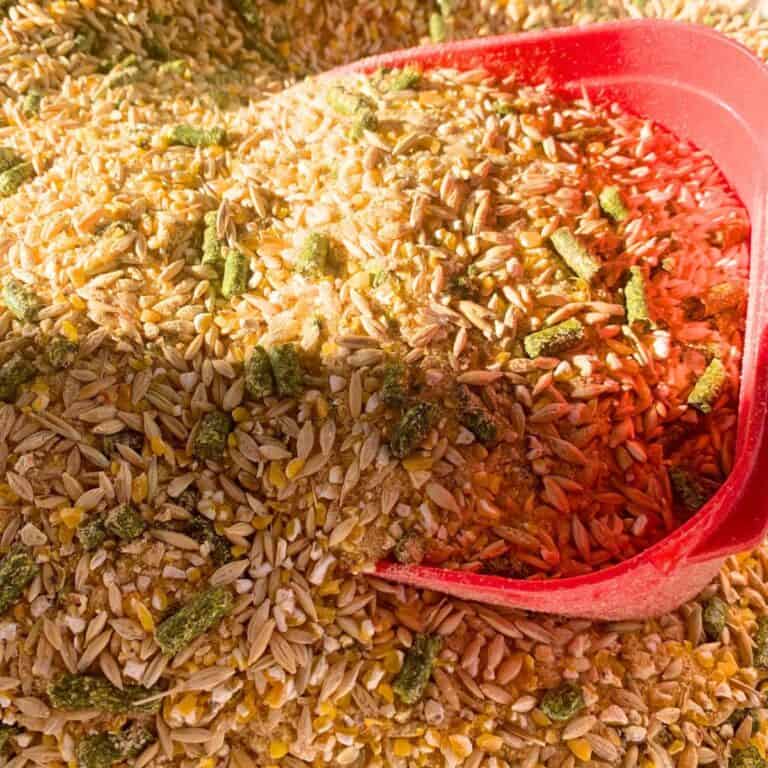
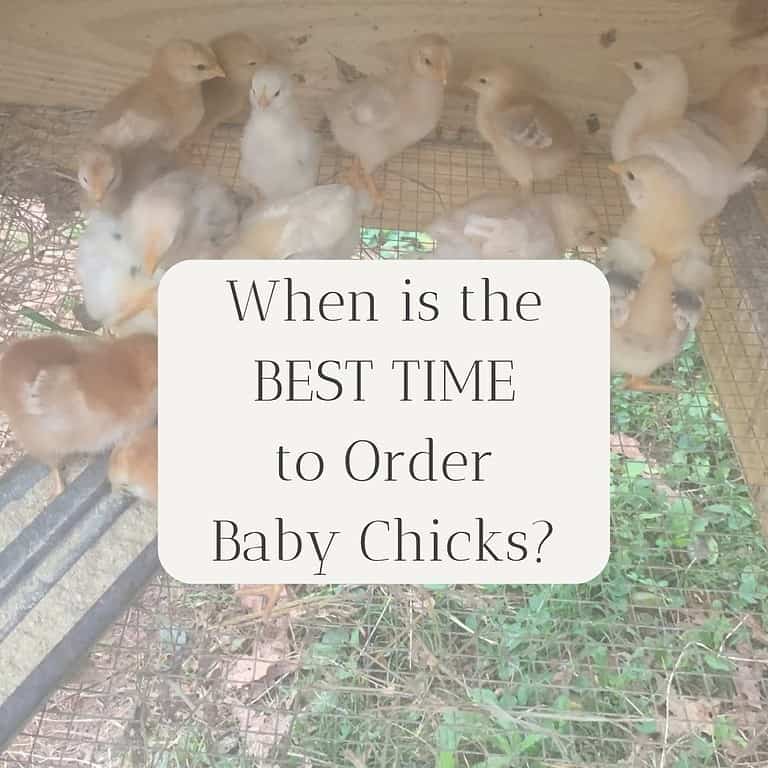
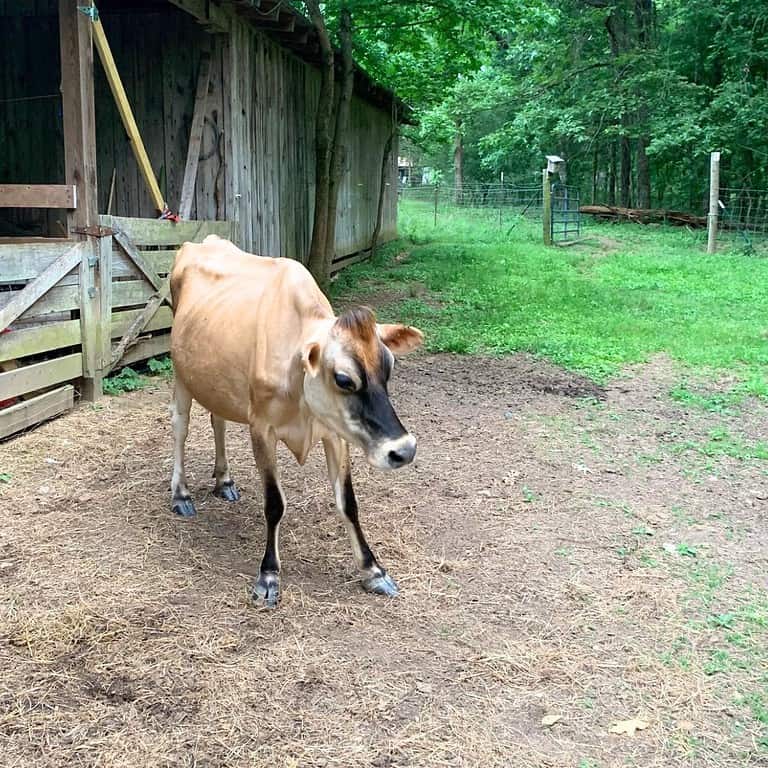

Saving this for when I hopefully have my own chickens someday! Question… We buy our eggs from several farms and I think some are washed and some are not. Is there any way to tell?
I would ask the farmer if they wash them or not when you purchase them. I’m sure they’ll be happy to tell you what they do. There’s not really a visual difference between a clean, washed egg and a clean, unwashed egg.
This is great info! I always heard not to wash eggs but never understood why. I always just left them dirty. Good to know the why behind it.
I’m glad this helped you! And thanks!!
Very informative, I learned a lot! I don’t have my own chickens, but I’m intrigued. Fresh eggs sounds amazing!
I don’t have chickens yet, but this is great information for when we do finally get some!
This is so helpful! If and when we can finally have chickens, I’ll know exactly how to wash the eggs correctly.
I had to check out this post because our chickens had a problem eating some of their eggs over the winter (ahhh) and it made such a mess with straw sticking to the remaining eggs. We also find many more dirty eggs during the wet spring weather!
That’s the worst, isn’t it? Our chickens have done the same thing. But at least the eggs clean up well! 😉